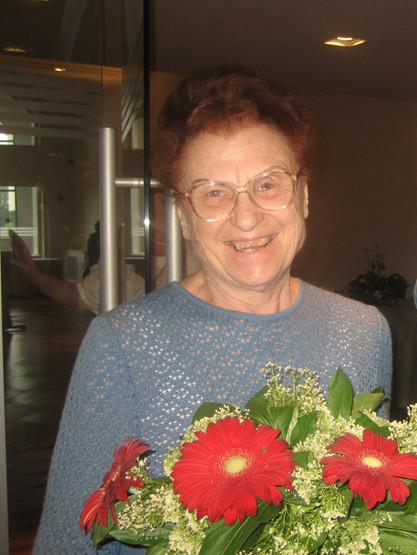- Main
- News
- In Memory of Nina Mikhailovna Popova (1930–2019) On the Occasion of Her 95th Birth Anniversary
In Memory of Nina Mikhailovna Popova (1930–2019) On the Occasion of Her 95th Birth Anniversary

On June 2, 2025, we commemorate the 95th anniversary of the birth of an outstanding scientist, Doctor of Chemical Sciences, laureate of the State Prize of the Republic of Kazakhstan, and recipient of the Order of the Badge of Honour — Nina Mikhailovna Popova.
Nina Mikhailovna's name is forever inscribed in the history of Soviet and Kazakhstani science. Her entire scientific career was dedicated to the advancement of catalytic chemistry — a field fundamental to progress in energy, environmental protection, and industrial technology.
Nina Mikhailovna was born on June 2, 1930. In 1948, she entered the Faculty of Chemistry at S.M. Kirov Kazakh State University. Even during her student years, her perseverance, determination, and exceptional abilities became evident. She was awarded the Stalin Scholarship and graduated with honors. Upon the recommendation of the university’s academic council, she entered the postgraduate program at the Institute of Chemical Sciences of the Academy of Sciences of the Kazakh SSR, where she began her serious research work. Under the guidance of academician D.V. Sokolsky, she successfully defended her Candidate and Doctoral dissertations.
From 1956 until the end of her active scientific career, Nina Mikhailovna worked within the system of the Academy of Sciences of the Kazakh SSR — initially at the Institute of Chemical Sciences, and later at the Institute of Organic Catalysis and Electrochemistry (IOCE), where she led the Laboratory of Oxidation for over 30 years. It was here that her scientific school took shape, students grew into specialists, and research directions emerged that continue to develop today.
Under her leadership, pioneering research was conducted in the field of heterogeneous catalysis. The laboratory developed effective catalysts for purifying industrial and vehicle emissions from toxic gases. New approaches were proposed for synthesizing multicomponent oxide catalysts, and the influence of support structures — including perovskites and zeolites — on catalytic activity was studied. Many of these developments were implemented in industrial plants across Kazakhstan and the CIS.
Nina Mikhailovna and her team introduced fundamentally new methods for synthesizing supported palladium, platinum-palladium, platinum-ruthenium, and multicomponent oxide catalysts for oxidative and complex purification of industrial and automotive gas emissions. Notably, they discovered how perovskite structures affect catalyst properties.
She also proposed a technology for the electrochemical recovery of platinum and palladium from the spent catalysts — a process highly relevant today in the context of sustainable development and resource conservation.
The lab's catalysts for neutralization of exhaust gases were installed in 40 industrial units across the CIS. In Kazakhstan, they were implemented at the “Merey” Scientific Production Association, and pilot tests were conducted on 100 vehicles.
Over her lifetime, Nina Mikhailovna published more than 500 scientific papers, received nearly 50 authorship certificates and patents, and authored six monographs. Under her mentorship, two doctoral and 30 candidate dissertations were successfully defended. Many of her students continue to work at leading scientific institutions in Kazakhstan and abroad.
Her work was widely recognized by both the state and the scientific community. She was awarded the State Prize of the Kazakh SSR, the Order of the Badge of Honour, medals such as “For Valiant Labor” and “Veteran of Labor,” the USSR Inventor’s Badge, and several awards from the USSR and Kazakh SSR Exhibition of Economic Achievements (EEA). Yet perhaps her greatest honor was the love and respect of her colleagues, students, and friends — all those fortunate enough to have known her personally.
One of her last areas of research involved the development of catalysts for the selective oxidation of methane and other alkanes into useful products, such as synthesis gas. Today, her students continue this work at the Laboratory of Oxidative Catalysis of the D.V. Sokolsky Institute of Fuel, Catalysis, and Electrochemistry. The laboratory is equipped with modern instruments thanks to her legacy, and is actively training master's and doctoral students from Al-Farabi KazNU, KBTU, and Satbayev University.
Nina Mikhailovna was not only a brilliant scientist, but also a true intellectual — a person of deep culture and principle. She uniquely combined strictness and kindness, high standards and willingness to help, scientific depth and personal humility.
Her life is an example of unwavering dedication to science and tireless help to her field. Thanks to people like Nina Mikhailovna Popova, science in Kazakhstan has developed strong traditions and earned international recognition.
Her bright memory will live on in the hearts of her colleagues, students, and all who had the privilege of working and communicating with this remarkable person.
Head of Laboratory, D.Sc. in Chemistry, Professor S.A. Tungatarova, and employees of the Laboratory of Oxidative Catalysis
